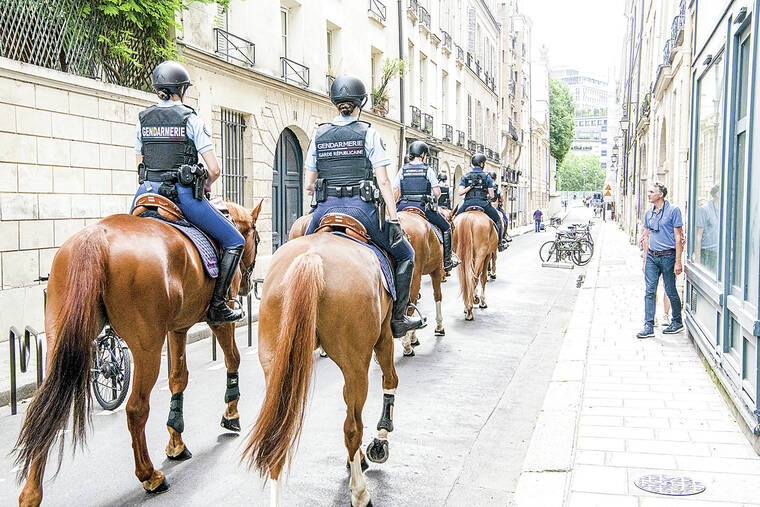Beefed-Up Olympics security thins out tourists, squeezing merchants
PARIS — Fabrice Pierret is used to catering to hordes of tourists who pack Le Lutétia, a brasserie he manages on the Île Saint-Louis, where a splendid view of the Seine River, with a glass of red wine and steak frites, has long made it a popular stop for visitors.
But with the opening ceremony of the 2024 Paris Olympics just days away, the crowds have thinned to a trickle. Business is down 50% — and more for shopkeepers nearby — as tough new security measures and an unexpected drop in tourism turns some of Paris’ most famous venues into veritable ghost towns.
ADVERTISING
“It’s a catastrophe,” said Pierret, surveying his near-empty terrace. Before him, thousands of brightly colored bleacher seats lined the quays of the Seine, which are now cordoned off. The river flowed by quietly — devoid of traffic — a scene reminiscent of COVID lockdowns.
“The Olympics were supposed to be great for business,” Pierret said. “Instead, we’re being hit really hard.”
Businesses have been counting on the Olympics to bring an economic boom. The city is turning into a giant outdoor sports venue, starting with the glittering opening ceremony Friday, when a flotilla will ferry athletes on a 4-mile stretch of the Seine to the Eiffel Tower, with more than 300,000 spectators lining the route.
But the mammoth undertaking has also turned central Paris into a maximum-security site, with miles of metal fences and police checkpoints. The restrictions will be partially relaxed after the opening ceremony.
People wanting to dine near the Eiffel Tower or get access to the Notre Dame plaza need a special QR code this week involving a background check, something many visitors are unaware of.
Big sponsors such as the French luxury goods conglomerate LVMH, Adidas and Coca-Cola stand to profit handsomely.
But small businesses stuck in zones with the strictest security have seen sales slump up to 70% in the past week, and 30% in other restricted areas of Paris, the Confederation of French Commerce reported Monday.
At the Boulangerie Notre-Dame, in the shadow of the cathedral, Charles Arnaud stood quietly waiting for the occasional client. When the bakery opened a month and half ago, he was selling 80 baguette sandwiches at lunchtime.
But after the security fences went up last week, crowds of tourists were stuck outside.
“From one day to the next, we had almost nobody,” said Arnaud. He now sells around 20 sandwiches a day — most bought by police officers patrolling the area. “It feels like we’re inside a cage,” he said.
Around the corner, Yasir Jagafar had closed one of his two souvenir shops, Notre-Dame Souvenirs. He typically rings up 1,800 euros daily (about $1,950) from the sale of Eiffel Tower key chains, French berets and Mona Lisa bags. Sales have now slumped to as low as 18 euros a day.
“We can’t keep operating this way,” he said. President Emmanuel Macron said Monday that the French government would look into possible compensation for businesses. Many are hoping that tourists will flood back after the restrictions are eased, but Paris trade organizations warned that more than 1,000 entrepreneurs would struggle to recoup losses incurred.
© 2024 The New York Times Company





